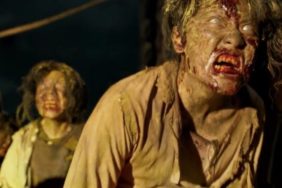Marc Forster is a genre director, whether he gets credit for it or not, with a career spanning racial dramas (Monster’s Ball), period pieces (Finding Neverland), action thrillers (Quantum of Solace) and now horror with World War Z, which took audiences by surprise this summer. We got on the phone with Forster to discuss some of the more interesting storytelling decisions in the film, and here’s what we got in return. Enjoy!
CraveOnline: There have been so many zombie movies with so many different ideas and themes, was there nowhere to go with zombies but just “enormously huge?”
Marc Forster: No, not at all. That had nothing to do with it. The key was basically, it is ultimately the title: “World War Z.” So it’s global epidemic. It’s a global apocalypse, and because it’s a global apocalypse, as the title says, it has to be huge. It has to be global.
Does the fact that it’s global change the paradigm of the zombie movie? Is this about globalization and the way that the world now seems more interconnected than ever?
Yes, absolutely. That’s what it is about. We’re all interconnected. We’re all in one way or another connected, and if something like this would happen it would affect everyone. It would be ultimately a race against time before humanity would end. I think that’s really, if the zombie apocalypse would happen, there is no place you could really hide because it would so fast and it would affect so many people. In that sense, I think yes, that’s correct.
One of the first things I noticed about this movie is that it seems to be in a rush to get going. There’s one scene with the family and then the entire world is taken over by zombies. Was that always the idea, to get that quick a start?
Yes. From early we always discussed that it hits, and we’re just in this intense ride that keeps them on the edge of their seat for the entire first act. That was always intentional, yes.
Do you feel like that gave you enough time to establish the characters beforehand? Because that’s usually the way a story like this is structured. Were you worried about losing anything?
I think that ultimately through the journey you will get to know the characters, but I always thought in that moment you’re thrown into a situation, and the situation is so overwhelming that once you get out of the situation you start getting glimpses of the characters. I find that an interesting approach for that kind of movie.
Another interesting approach that this movie takes is with Brad Pitt’s character, about whom we know how much he loves his family, and we know he used to be a special investigator for the U.N. But beyond that in many ways he’s an observer for a lot of the film. Did you feel it was necessary to have him be the audience’s guide more than anything else?
Personally I think sometimes having a character being an observer, and being more the silent type, provides more insight to the character than necessarily setting up a dramatic scene through dialogue and putting them in a certain situation. Which is an approach, but I felt like you get to know his character through the action he takes, and through the scenes he has with his family and with other people, how he functions and how he deals with certain circumstances. I felt that would, for this kind of character, give you a three-dimensionality where you understand him and you connect with him.
Given the scale of this movie and the size of some of some of the set pieces you put together, it always seems like there’s nothing you couldn’t do in World War Z. Is there anything you couldn’t do, or set piece you could afford or have time for?
I personally always felt like… obviously we didn’t have time to do it, but I thought we could have done an outbreak on the aircraft carrier. If I had had all sorts of money and time… I pitched that to the studio and everybody [laughs] but the family has to leave. Obviously it’s interesting, all the personnel on the aircraft carrier needs to be used, and there’s only a certain amount of room on it, but I thought it always would have been fun to have an outbreak on the aircraft carrier.
Was there ever any scenes or footage of the family after they left the aircraft carrier, or were you trying to turn that into a big mystery for Brad Pitt’s character?
No, it was a mystery.
Are there any other horror genres you would like to tackle in the future?
The horror genres are always very appealing to me, so this probably will not be the last one, but for me it’s always project-by-project. It’s when I feel inspired, in the moment, what I read. But I think there’s a great possibility for that.
William Bibbiani is the editor of CraveOnline’s Film Channel and co-host of The B-Movies Podcast. Follow him on Twitter at @WilliamBibbiani.







